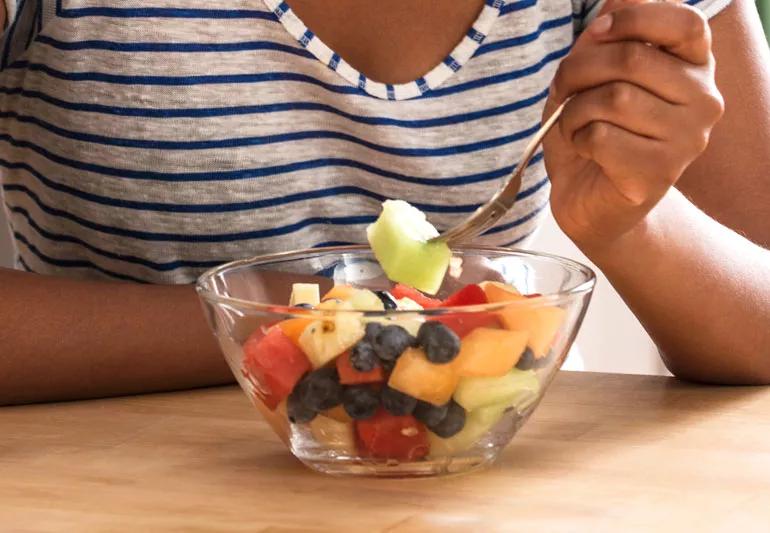What you eat may protect you from a ‘brain attack’

Image content: This image is available to view online.
View image online (https://assets.clevelandclinic.org/transform/05493bda-03b6-49ab-8060-4cf9dc3bcd52/foodsPreventStroke-519517691-770x533-1_jpg)
woman eating fruit salad
Up to 80% of strokes can be prevented. What you eat each day can play a big role not just in weight control, but also in protecting you against stroke.
Advertisement
Cleveland Clinic is a non-profit academic medical center. Advertising on our site helps support our mission. We do not endorse non-Cleveland Clinic products or services. Policy
“Food, as it relates to stroke, is all about prevention,” says certified nurse practitioner Susan Jaeger. “Your food choices can reduce the risk of cholesterol buildup in the arteries, and these blockages are a major cause of stroke.”
Think of it this way: Stroke is often referred to as a “brain attack” because it’s affecting your brain as a heart attack would your heart. One American dies every four minutes because of stroke, and to help offset your risk, a heart-healthy diet is imperative.
Jaegar offers advice on how you can can make the right food choices to stave off stroke:
It’s a way of reducing your intake of cholesterol, “bad” fats and sodium while still filling you up. Some foods can be deceiving, though.
“You may think you’re doing a healthy thing by ordering a salad at a restaurant,” says Jaeger. “But if it’s loaded with lunch meats, cheese and ranch dressing, you’re really eating a large amount of calories, fat and salt, which can all raise your risk of stroke.”
Not only that, but one study reported that artificial sweeteners can actually increase your risk of stroke, too. And yes, that includes your beloved diet soda.
The Mediterranean diet is the best for helping increase your intake of fruits and veggies since it’s shown to be the best for your heart. Put a few Mediterranean diet-friendly recipes in your weekly recipe cycle to reap the benefits of lean meat, fish, fruits, veggies and whole grains.
Advertisement
Red meat, butter and fried food are notorious for increasing your risk of stroke. Instead, try baking, broiling and steaming your food instead of frying it.
Unfortunately, that means nixing your favorite Alfredo or heavy cream sauces from your diet, too. When choosing meat, be sure to choose white meats like skinless chicken instead of red meat. If you want to try meat substitutes, include beans, peas, lentils or tofu in your diet.
Omega-3 is a polyunsaturated fat — the healthy kind of fat — that raises your level of “good” cholesterol. It has also been shown to help prevent stroke.
“Find it in fish, flaxseed and omega-3 rich eggs,” she says. “Omega-3 also lowers bad cholesterol, which helps to reduce the risk of stroke.”
The American Heart Association recommends at least two servings of fatty fish each week, which can include salmon, mackerel, sardines and herring. Consult with your doctor or dietitian to figure out how much omega-3 you need in your diet.
Alcohol can raise blood pressure, which is a major risk factor for stroke. If you want to have a drink, keep it to no more than two drinks a day for men and one drink a day for women. Stick to red wine, too, since it has heart and brain-protecting properties.
While we crave salty food sometimes, it’s important to watch how much sodium we actually eat. According to the American Heart Association, the average American eats about 3,400 mg of sodium each day. The AHA recommends no more than 1,500 mg a day, and if you have certain medical conditions, you should consume even less.
“Reduce its use in your cooking and don’t even touch the salt shaker during your meal,” says Jaeger. “Try replacing salt with herbs in your cooking to enhance the natural flavor of the food without raising blood pressure.”
Salt can be hiding in your favorite food, too. High sodium levels can be found in fan favorites like pizza, canned soup, bread, sandwiches, sauces and deli meat. When shopping, look at the label to make sure you’re buying items with the least amount of sodium possible. If you’re heading out to a nice dinner (socially distanced, of course), don’t be afraid to ask the server if the chef can reduce sodium levels in your meal.
Advertisement

Sign up for our Health Essentials emails for expert guidance on nutrition, fitness, sleep, skin care and more.
Learn more about our editorial process.
Advertisement
Hormonal changes and pregnancy are some factors unique to women and people AFAB
Your food choices can have a profound impact on how long you’ll live
Know the warning signs + decrease your risk
The flu, RSV, COVID-19, pneumonia and more typically circulate during cold weather months. I added this change
Simple swaps improve a comfort food staple.
Simple swaps improve a comfort food staple.
Type 2 diabetes isn’t inevitable with these dietary changes
Applying a hot or cold compress can help with pain
Pump up your iron intake with foods like tuna, tofu and turkey